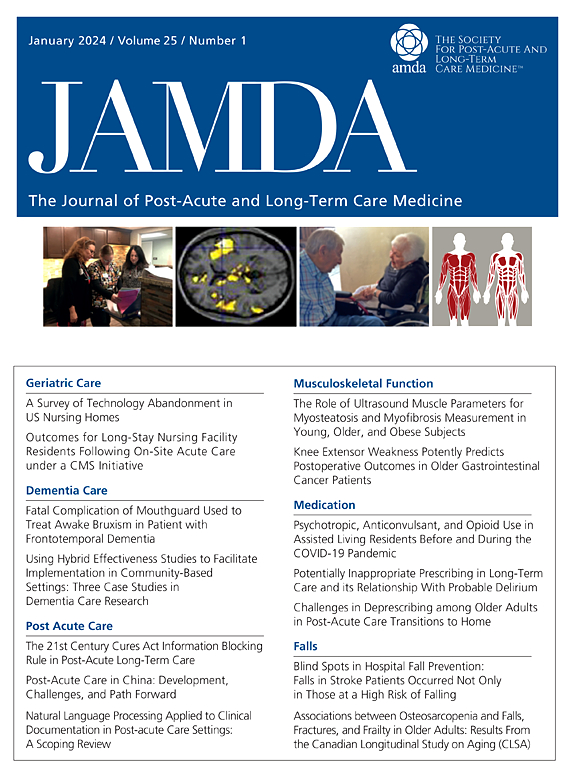Navigating Dilemmas on Advance Euthanasia Directives of Patients with Advanced Dementia
IF 4.2
2区 医学
Q2 GERIATRICS & GERONTOLOGY
Journal of the American Medical Directors Association
Pub Date : 2024-10-10
DOI:10.1016/j.jamda.2024.105300
引用次数: 0
Abstract
Objectives
This study revisited the complexities faced by physicians in meeting due care criteria for euthanasia in patients with advanced dementia in The Netherlands. Despite increasing cases and legal provisions for advance euthanasia directives (AEDs), physicians encounter challenges with ethical issues, including patient communication and assessing unbearable suffering in patients who lack decisional capacity. This study examines the perspectives of elderly care physicians (ECPs), support and consultation on euthanasia in The Netherlands (SCEN) physicians, and euthanasia expertise center (EEC) physicians.
Design
A multimethod descriptive study using a questionnaire with both closed and open-ended questions.
Setting and Participants
This study explores the complexities faced by physicians in handling AED-based euthanasia requests of patients with advanced dementia.
Methods
Baseline characteristics of physician subgroups were analyzed descriptively, and subgroup variations were assessed using univariate regression. Qualitative data underwent thematic content analysis.
Results
With a 13.8% response rate, the study included 290 participants: 108 ECPs, 188 SCEN physicians, and 53 EEC physicians. Some had combined roles: ECP and SCEN physicians (n = 29), ECP and EEC physician (n = 1), SCEN physicians and EEC physicians (n = 17), and ECP, SCEN physicians, and EEC physicians (n = 6). ECPs received most AED-based euthanasia requests but only 7 EEC physicians and 1 SCEN physician performed euthanasia. All subgroups stressed the importance of patient communication. ECPs found euthanasia ethically justifiable only when communication was possible, highlighting the need to understand current euthanasia wishes and verify unbearable suffering. Effective communication was deemed crucial for confirming request relevance, identifying obstacles, involving patients, fostering trust, and alleviating fears. Physicians generally agreed that unbearable suffering could be assessed through patient expressions, observations, and family input.
Conclusions and Implications
Despite receiving AED-based euthanasia requests, few physicians proceeded. Subgroup analysis showed varying views, with ECPs emphasizing communication and EEC physicians focusing on determining unbearable suffering. All subgroups highlighted the importance of current patient expressions and involvement in the decision-making process.
为晚期痴呆症患者提前安乐死指令的困境导航。
研究目的本研究重新审视了荷兰医生在满足对晚期痴呆症患者实施安乐死的适当护理标准时所面临的复杂问题。尽管预先安乐死指令(AEDs)的案例和法律规定越来越多,但医生在伦理问题上仍面临挑战,包括与患者沟通以及评估缺乏决定能力的患者无法忍受的痛苦。本研究探讨了老年护理医师(ECPs)、荷兰安乐死支持和咨询医师(SCEN)以及安乐死专家中心(EEC)医师的观点:设计:多方法描述性研究,采用封闭式和开放式问题的调查问卷:本研究探讨了医生在处理晚期痴呆症患者基于 AED 的安乐死请求时所面临的复杂问题:对医生亚组的基线特征进行了描述性分析,并使用单变量回归法评估了亚组的差异。对定性数据进行了主题内容分析:该研究的回复率为 13.8%,共有 290 人参与:108 名 ECP、188 名 SCEN 医生和 53 名 EEC 医生。其中一些人还兼任多种角色:ECP 和 SCEN 医生(n = 29),ECP 和 EEC 医生(n = 1),SCEN 医生和 EEC 医生(n = 17),以及 ECP、SCEN 医生和 EEC 医生(n = 6)。ECP 收到了大多数基于 AED 的安乐死请求,但只有 7 名 EEC 医生和 1 名 SCEN 医生实施了安乐死。所有分组都强调了与患者沟通的重要性。ECPs 认为,只有在可以进行沟通的情况下,安乐死在伦理上才是合理的,并强调需要了解当前的安乐死意愿并核实无法忍受的痛苦。有效的沟通被认为是确认请求相关性、识别障碍、让患者参与进来、培养信任和减轻恐惧的关键。医生们普遍认为,无法忍受的痛苦可以通过患者的表达、观察和家属的意见来评估:尽管收到了基于除颤器的安乐死请求,但很少有医生继续实施。分组分析显示了不同的观点,ECP 强调沟通,而 EEC 医生则侧重于确定无法忍受的痛苦。所有分组都强调了当前患者表达和参与决策过程的重要性。
本文章由计算机程序翻译,如有差异,请以英文原文为准。
求助全文
约1分钟内获得全文
求助全文
来源期刊
CiteScore
11.10
自引率
6.60%
发文量
472
审稿时长
44 days
期刊介绍:
JAMDA, the official journal of AMDA - The Society for Post-Acute and Long-Term Care Medicine, is a leading peer-reviewed publication that offers practical information and research geared towards healthcare professionals in the post-acute and long-term care fields. It is also a valuable resource for policy-makers, organizational leaders, educators, and advocates.
The journal provides essential information for various healthcare professionals such as medical directors, attending physicians, nurses, consultant pharmacists, geriatric psychiatrists, nurse practitioners, physician assistants, physical and occupational therapists, social workers, and others involved in providing, overseeing, and promoting quality

 求助内容:
求助内容: 应助结果提醒方式:
应助结果提醒方式:


